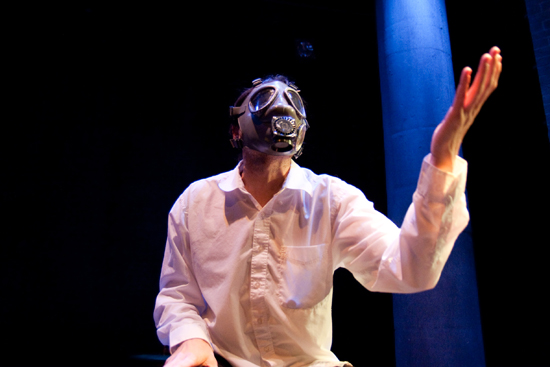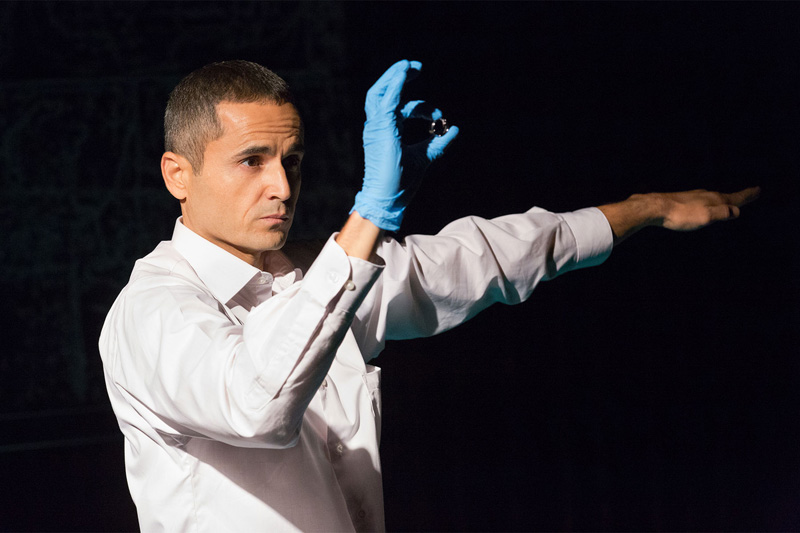By: Katherine Gianni
Shakespeare asked the question, “what’s in a name?” To some, perhaps very little. To others, like the parents of actor and playwright Ibrahim Miari, a name defines an identity. They addressed their son by more than one throughout his childhood. This is where Mr. Miari’s reckoning with his identity begins.
On Monday, March 4, Mr. Miari returned to his alma mater to perform In Between, a one-man show he produced in 2009 as his thesis project for BU’s MFA in Theatre Education program. Monday evening’s performance was co-sponsored by the Elie Wiesel Center for Jewish Studies.
“I always wanted to come back to the question, what would it be like to just accept who we are?” Mr. Miari said during Q&A, following his show. “What would it be like to just be me, and to be content with that?”
The performance chronicles Mr. Miari’s own life. Born to a Jewish mother and an Arab father, Miari tells his audience that if not for his mother’s conversion to Islam, his parents would not have been able to stay together. Growing up in the Israeli city of Akko, he attended a Jewish school where he was known as Abraham, and an Arab school where he went by Ibrahim, his birth name. His identity is composed of multiple cultures, traditions, and religions–a richness that he grapples with as a both a gift and a burden.
The show also reflects on his relationship with his fiancé, Sarah Goldberg, an American Jew, and the complications they encountered when planning their wedding.
The performance opened with Mr. Miari, clad in a white button down and gray khakis, spinning around and around to pulsing music. The dance itself is known as Sufi whirling, a form of physically active meditation that Mr. Miari said he’s been practicing for more than a decade.
Mid-spin, a blaring intercom interjected.
“Attention! Paging passenger Ibrahim Miari….please report to El Al Security,” the voice droned. Mr. Miari continued his dance, unbothered by the request. The voice grew louder and more frequent, until Mr. Miari had no choice but to acknowledge its presence.
In a flash, his demeanor shifted, a smile spreading across his face–one that bore an eerie similarity to Heath Ledger’s Joker. Slowly, he slipped a blue latex glove over his right hand, proceeding to mime the act of an airport security frisk. In a delicate balance, he played both the guard and his subject, his facial expressions continually shifting between a look of contempt and a look of fear.
Character splits continued throughout the show as Mr. Miari personified many individuals from his own life. With an exuberant laugh he became his Jewish mother in-law, talking excitedly about grandchildren and pleading that Mr. Miari have his wedding officiated by a Jewish rabbi. Moments later, Mr. Miari’s attitude hardened to reflect the sternness of his Arab father, who voiced he would not attend his son’s wedding unless it was a traditional Islamic ceremony.

Like the Sufi dance moves, these impersonations swirled around and around, voicing opinions, biases, and concerns for his life weighing heavily on his shoulders. How would he raise his children? Which traditions did he intend to keep? In which direction did his moral compass point?
“Not Jewish enough, not Israeli enough, not Arab enough, not Palestinian enough…” he said in one scene, his voice trailing off. This struggle to define his identity is the crux of Mr. Miari’s show–one that doesn’t necessarily leave audiences with a definitive answer. Instead of choosing one particular facet of his identity to latch onto, he is always left somewhere in between.
Audience members connected with this message and voiced their own questions and perspectives in their responses post-performance.
“Your show resonated with me in a lot of ways,” one man said. “As a Latino American and growing up in my community, there is the way that Americans view Latinos and the way that Latinos view Americans. I see a lot of parallels between your experience and mine.”
Another man asked if the intense security checkpoint scene was based on personal experience.
“What do you think?” Mr. Miari countered. “Next question.”
Towards the end of the conversation, one woman raised her hand, asking if Mr. Miari could speak to the notion of identity politics being at the forefront of a broader, national conversation.
“My job is not to fix the world–my job is not to try to understand it, even,” he said. “We all have stories to tell and we all try to express ourselves in one way or another. What we need to do, is learn how to enjoy it.”

